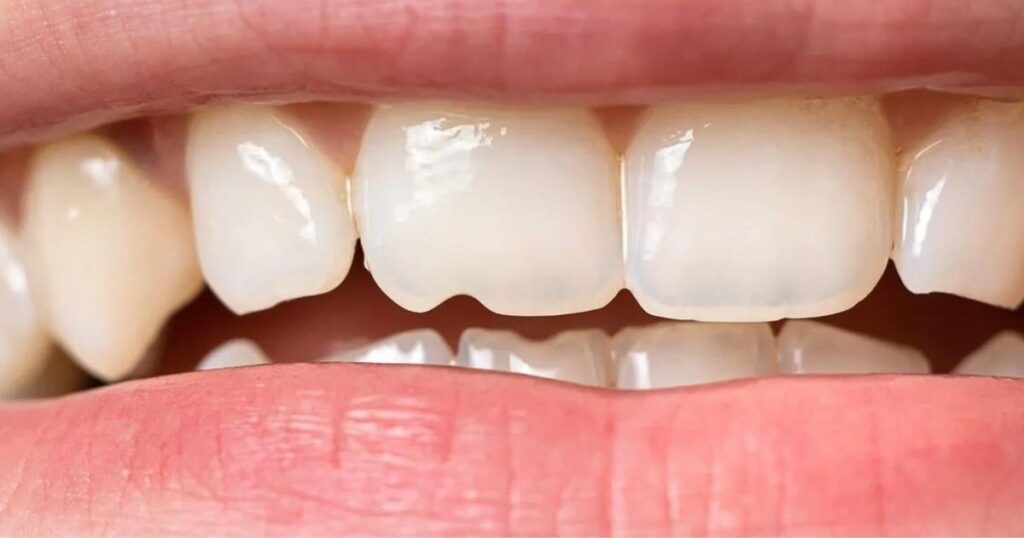Chipping of teeth is surprisingly one of the most common problems, one which almost every other person has to deal with at one time or another in life. While this may seem like a minor problem, if a chipped tooth is not treated in time, it could lead to further serious dental problems. It is important to learn why teeth chip, the associated risks of ignoring a chipped tooth, and the ways in which one can prevent and treat the problem.

Why Do Teeth Chip?
Teeth are really strong, harder than the hardest bones of your body. However they are not indestructible. Many factors could chip teeth and being able to learn these factors is sometimes the first way to precaution.
Physical Trauma
All sad incidents and injuries are counted as the most usual causes for chipped teeth. This means that trauma to the teeth can crack or chip off the tooth from a fall, a blow to the face while playing some kind of sport, or even when you inadvertently hit your head or face against some hard object. It goes without saying that athletes with contact sports are more prone to dental injuries than others that are non-contact sports. This exposure could be avoided with the aid of a protective device called a mouthguard. A mouthguard acts as a cover between your teeth and a potential impact or sudden shock.
Biting on Hard Objects
Our teeth are meant to chew food, not to handle excessive hardness. Ice, hard candy, and other non-food items—such as pencils or fingernails—are common objects people bite on that can transfer too much pressure to the teeth and cause them to chip or crack. The repeated pressure of biting on hard objects causes the enamel, the hard outer layer of the tooth, to wear down over time, making it weak enough that other types of damage may occur. To avoid this, one should not use their teeth as tools and also be watchful with what they bite into.
Decay and Cavity
Poor oral hygiene could lead to decaying of a tooth that would weaken a tooth’s structure. The cavity makes small holes in the enamel of your teeth that, in turn, make the tooth weak and hence susceptible to chipping. Apply just a little extra stressor to the tooth, something like biting down onto something hard, and a tooth with a cavity in it will chip easily.
Bruxism
Bruxism is a condition where a person tends to habitually grind or clench his teeth continually, which is often unconscious and even occurs during sleep. Because of this continuous grinding, the enamel will gradually wear down, and chipping or cracking can occur. Bruxism is often linked to manifestations of stress, anxiety, or sleep disorders. The constant pressure of grinding may weaken the teeth over time and thus render the teeth more susceptible to damage.
Aging and Natural Wear
With increasing age, the wear and tear of teeth also increases. Enamel wears off after a long time of use, making the tooth susceptible to chipping. While this might be the normal wear-and-tear process of aging, it could be hastened through certain habits, like grinding or poor hygiene of the mouth. Just like with age, regular care and attention to oral health become even more important in ensuring that your teeth remain strong and intact.
The Dangers of Ignoring a Chipped Tooth
Since it does not hurt, you probably think that the small chip in your tooth is insignificant. On the contrary, chipped teeth pose a couple of complications to oral health and general health in totality.
Increased Tooth Sensitivity
When a tooth chips, the inner layers of the tooth are exposed to dentin and sometimes even to the pulp, which houses nerves and blood vessels. Increased sensitivity based on the exposure to the pulp might relate to hot, cold, or sweet foods and beverages after a chipping of the tooth. Sometimes the discomfort is very mild or can be extreme, depending on the degree of the damage.
Risk of Infection
A chipped tooth may provide an easy avenue for bacteria to enter the tooth and thereby create infection. Should bacteria reach the inner surface of the tooth, the result would be an abscess—an excruciatingly painful development that may necessitate treatment as drastic as a root canal or extraction of the tooth. The point of such complications being avoided, however, is early intervention.
Further Damage
What was supposed to be a minute chip may become a more extended crack, especially if the tooth stays under additional tension. As the demolition advances, so does the vulnerability of the tooth towards complete fracture or splitting, when such lesions of the tooth already need more extended and costly dental treatments, such as crowning, root canal treatment, or even full replacement.
Aesthetic Problems
Chipped teeth can be catastrophic to one’s smile and may further dent one’s confidence. Individuals are scared to show the world their chipped or damaged teeth. The good news: with modern dental treatments, your smile can be returned to its original glory.
Dental Health Consequences
A chipped tooth can deter the balance of your occlusion, eventually wearing out other teeth unevenly. Such a disparity is known to cause an array of problems, including pain in the jaw, headache, and even further damage to the other teeth. A chipped tooth is, therefore, capable of being stopped from leading into any of these issues provided it gets treated timely.
How to Avoid Chipping Teeth
The best thing to do with a chipped tooth is to avoid it in the first place. Here are some very helpful strategies that will help you in keeping your teeth strong and free from chips, including practicing good oral hygiene.
The basic secrets of good oral hygiene include brushing of teeth with fluoride toothpaste twice a day, flossing once daily, and the use of an antibacterial mouthwash to remove plaque and strengthen enamel, thus preventing decay. A diet low in sugary and acidic foods also significantly helps your teeth stay healthy and less prone to chipping.
Wear a Mouthguard
If you have a sporty lifestyle or grind your teeth at night, then it’s a good idea to invest in a mouthguard. A mouth guard, which your dentist can personally create, fits better and provides better protection than over-the-counter ones. Because the guard will fit perfectly on your teeth, you are guaranteed to enjoy maximum comfort while offering the ultimate in keeping off injuries or damages caused by grinding.
Avoid Chewing on Hard Objects
Avoid using your teeth as tools, which may include crunching on ice, hard candy, or non-food items like pens or fingernails. These types of actions put your teeth under undue stress and tend to chip them. In fact, if you catch yourself engaging in these behaviors, become aware enough to stop doing it by being cognizant of when you are doing these things and substituting in safer alternatives.
Manage Bruxism
If you grind your teeth, bruxism management is key in ensuring that you don’t chip your teeth. Generally, bruxism may be caused by stress; therefore, adding activities such as exercise, meditation, or learning some form of relaxation will help.
How to Treat a Chipped Tooth
If you’ve already chipped a tooth, it’s advisable to go for treatment as soon as possible. Treatment options depend on the size and location of the chip as well as whether the chip has caused damage to the inner layers of the tooth.
Dental Bonding
Dental bonding is an easy and painless procedure for small chips. Your dentist coats the chipped area with tooth-colored resin and then shapes and molds it to best re-create the shape of your original tooth. After the tooth-colored resin is applied, hardened, and shaped, a special light will be used to set it in place. Bonding is quick, minimally invasive, and can be done in a single visit.
Dental Veneers
Dental veneers are thin shells made of porcelain or composite resin, custom-made to cover the front surface of the tooth. They are ideal for more severe chips or for cosmetic enhancement, offering a durable and aesthetic solution to restore the tooth to its original form.
For extensive chips where the tooth has been significantly weakened, dental crowns may be the best option. A crown fits over the entire tooth, protecting it from further damage while restoring its shape and function.
Root Canal Treatment
If the chip has exposed the inner pulp of the tooth and has led to infection or severe damage, a root canal treatment might be required. During this procedure, the damaged pulp is removed, and the inside of the tooth is cleaned and sealed. The tooth is then restored with a crown to ensure its strength and functionality.
Final Thoughts
Chipped teeth are a common dental problem, but they are preventable and treatable with the right care. By understanding the causes of chipped teeth and taking steps to protect your smile, you can avoid the pain and inconvenience of this issue. If you do experience a chipped tooth, seeking prompt treatment from a skilled dentist like Dr. Amul Patel at Aurora Smiles NY is essential. With their expert care and advanced treatment options, you can restore your smile and maintain your oral health for years to come.
Don’t wait for a small issue to become a bigger problem—schedule an appointment with Aurora Smiles NY today to ensure your teeth are in the best possible condition.
